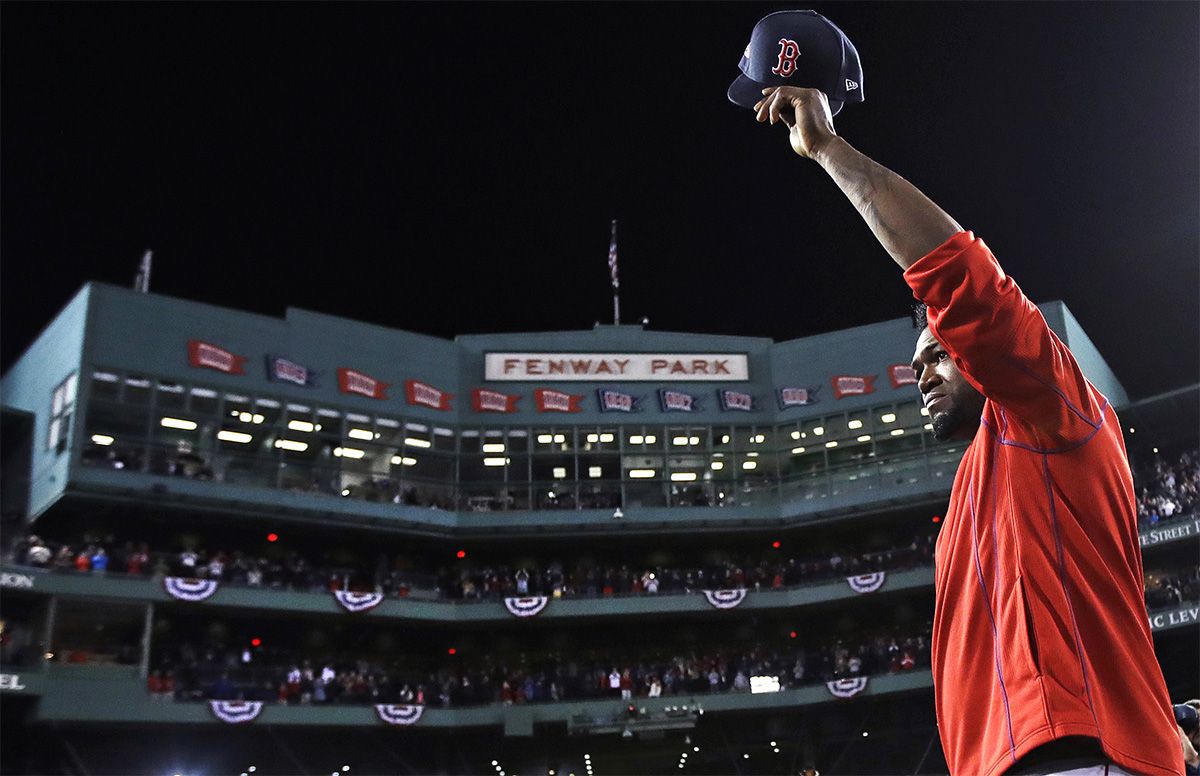Farewell David Ortiz, the Most Important Player in Red Sox History

Image via AP
October baseball isn’t scripted, even though David Ortiz often made it feel that way. The Cleveland Indians completed their sweep of the suddenly moribund Red Sox Monday night, shutting the door on a series that lacked drama or intrigue. For a team that slugged its way to a division title, this was an anticlimactic way to go out.
Ortiz had his opportunities to come up big in Game 3. He batted with runners on third and second in the sixth inning, but could only muster a sacrifice fly into center field. His final plate appearance came with a man on first base in the eighth, but he walked on four straight pitches. When Hanley Ramirez smacked an RBI single later in the frame to bring the Sox within one, Ortiz was already seated in the dugout, having left for a pinch-runner moments earlier. He wouldn’t emerge again until after the final out was recorded.
We miss you already, @davidortiz: https://t.co/hpeqkhJEhd #ThanksPapi pic.twitter.com/7yG3ShppFL
— MLB (@MLB) October 11, 2016
When the Red Sox signed Ortiz to a one-year contract in January 2003, he wasn’t even expected to crack the starting lineup—never mind become the most important player in franchise history. Ortiz didn’t start playing everyday until that June, finally leapfrogging Jeremy Giambi on the depth chart.
Three World Series rings and 483 home runs later, that whole situation looks awfully silly. In just two years’ time, Ortiz branded himself a postseason hero, blasting three walk-off hits—two home runs and a single—during the Red Sox’s 2004 curse-breaking championship run. Two years after that, he became the franchise’s single-season home run leader. In 2007, Ortiz was the catalyst of another World Series winner, and hit .688 in the Fall Classic three years ago to bring home MVP honors. This season, Ortiz passed Carl Yastrzemski for No. 2 on the Red Sox all-time home run list. His enormous contributions are all over the record books, but perhaps his most indelible legacy is the seemingly unbreakable bond he built with the fans. That was on full display Monday night, when Ortiz says he lost control of his emotions.
“Like I’ve said, I’ve been trying to hold my emotions the best I can, but that last second I couldn’t hold it no more,” Ortiz said after the game, via WEEI. “That’s how we feel about what we do because we love what we do. I respect this game so much and love this game so much that as long as I play I want to always be one of the best. Not because of me, not because of my person, because I don’t really care about that. I really care about the fans. I really care about the emotion that they live through. I really care about everything that comes with it, community-wise, what we do off the field. It’s the whole package. It comes with a lot of things, so I really care about all that.”
Unlike Red Sox icons from yesteryear, there was never a contentious moment between Ortiz and the fans. Ted Williams once spit on a group of spectators in 1956 and Yastrzemski was infamous for his surly demeanor. Even the beloved Pedro Martinez engaged in some public spats, such as when he called the Yankees “his daddy” following a particularly atrocious outing against them in September 2004.
This special relationship went from companionable to legendary in April 2013, days after the Boston Marathon Bombings. Ortiz, a Dominican-native who didn’t set foot in Boston until he was 27 years old, somehow perfectly encapsulated in four little words what the city was feeling: “This is our f—— city,” he said, adding, “and nobody is going to dictate our freedom.”
Ortiz was a great baseball player who forever changed the course of Red Sox history. But Big Papi is a Boston legend. It’s the reason why it was so shocking to see him come up short Monday night.
There are few things more nonsensical than expecting a baseball player to deliver in the clutch. That’s the kind of suspension of reality Ortiz fostered in the minds of Red Sox fans throughout his time here. In the coming years, there will be plenty of more opportunities to celebrate him. But no ceremony could ever top the tearful goodbye he gave Monday. The fact that it happened in a rare moment of failure, rather than triumph, is a reminder of how good the ride has been.


